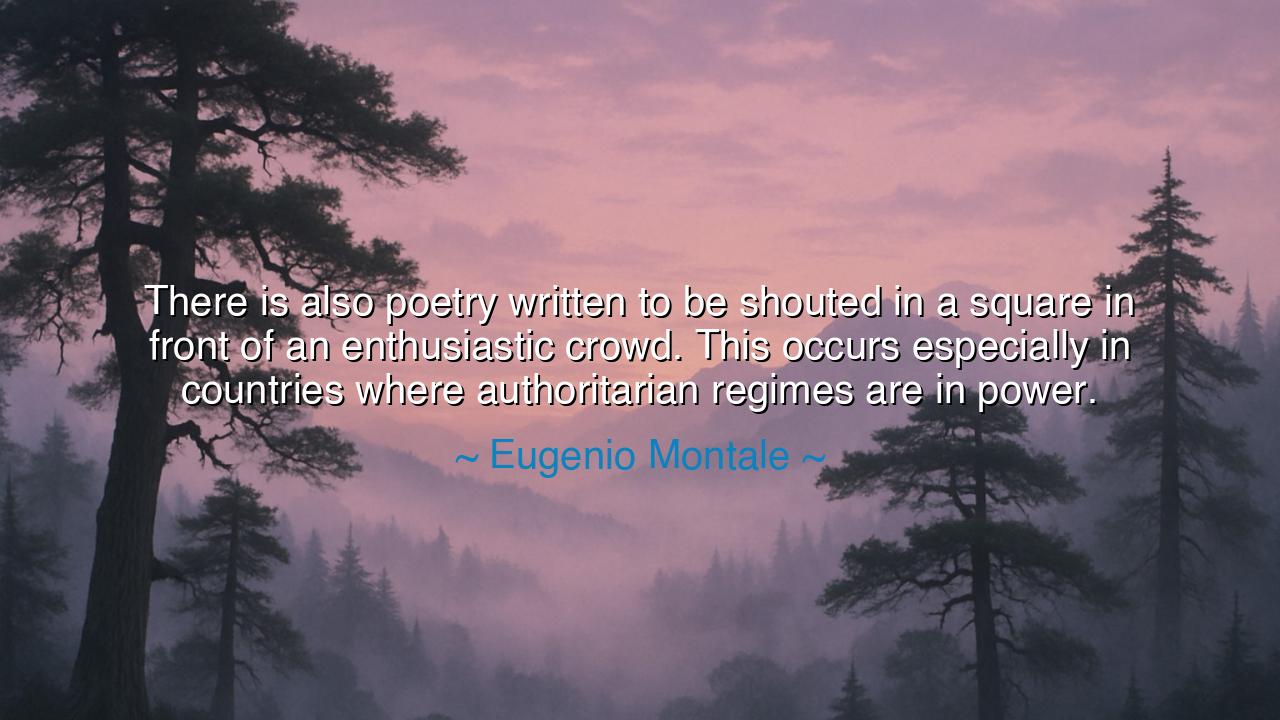
There is also poetry written to be shouted in a square in front
There is also poetry written to be shouted in a square in front of an enthusiastic crowd. This occurs especially in countries where authoritarian regimes are in power.






Hear then the words of Eugenio Montale, who with sharp vision perceived the fate of poetry when nations are shackled by the weight of tyranny: “There is also poetry written to be shouted in a square in front of an enthusiastic crowd. This occurs especially in countries where authoritarian regimes are in power.” This utterance is no idle thought, but the wisdom of one who understood how the soul of verse changes its garment when the air grows heavy with oppression. In times of peace, poetry may whisper to the heart, but in times of chains, it must thunder to awaken the sleeping spirit.
For when authoritarian regimes rule, they do not merely bind the body, they seek to silence the tongue and dim the imagination. Yet the poet is like the fire in the mountain—if buried, it only gathers strength until it bursts forth. In such lands, verse cannot remain gentle or private; it must be raised upon the public square, forged into a weapon, a cry, a banner of resistance. The poet, once a contemplative, becomes a herald, and his lines a trumpet blast calling the people to remember who they are.
Consider the story of Pablo Neruda, who in Chile lifted his voice not only in tender hymns of love but in roaring denunciations of oppression. His verses were carried by the wind into the hands of workers, farmers, and dreamers who thirsted for dignity. And when he read his poems aloud, they did not sound like delicate songs for the drawing room, but like battle chants echoing across the Andes. This is the transformation Montale foresaw: when rulers tighten the noose, poetry becomes thunder.
So it was too in the days of the Greek tragedians, when Aeschylus and Sophocles clothed eternal truths in words that could stir entire assemblies. Their plays, performed before citizens, were not mere entertainment—they were a school of freedom, a reminder of justice, a warning to tyrants. For every age of oppression summons its chorus, every darkened square becomes a stage where verse may inflame the courage of the multitude.
Yet Montale’s words also carry a warning. He knew that poetry shouted in the square, while powerful, is also born of sorrow. For it means the land is not free, that voices are forced to rise in defiance rather than in quiet reflection. The very need for such poetry testifies to the presence of chains. It is a noble fire, yes, but it is fire forged in suffering.
And so, children of the future, take heed: let not your societies fall into such decay that the poet must again become only the herald of rage. Strive instead to preserve the spaces where poetry may speak softly, where the verse of love and wonder may thrive. For the true strength of a free people is not only in their ability to cry out against injustice, but also in their freedom to sing of the moon, the sea, and the heart without fear.
Yet if the hour of shadow comes, do not falter. Let your words rise like shouts in the square, let them be torches against the night. Read aloud, gather together, and kindle courage through the rhythm of your voices. For tyrants may command armies, but the word spoken in unity carries a might no sword can quell.
Therefore the lesson is clear: cherish freedom, guard it with vigilance, and keep your voices alive. Speak truth even when silence is demanded. Read poetry not only in solitude, but also in fellowship, so that should darkness fall, you are ready. Let your life itself become a verse—sometimes whispered in beauty, sometimes shouted in defiance, but always alive, always free. This is the charge Montale leaves to us.






HVHien Huynh Vinh
Poetry shouted in front of a crowd under oppressive conditions sounds both thrilling and dangerous. How do poets decide which words can stir such powerful emotions in such a charged environment? Could it be that the urgency and rawness of poetry in these situations resonate differently than the more introspective or personal poetry we usually encounter?
TBNguyen Thi Thai Binh
I find it fascinating that Montale points out the connection between authoritarian regimes and poetry as a tool for mass expression. This suggests that poetry, in such contexts, isn't just about aesthetics but about survival and resistance. How does the style of this kind of poetry differ from more traditional forms of poetic expression? Does it lose its artistic depth in favor of political urgency?
PNPhuc Nguyen
This quote makes me think about the role of poetry in politics. In times of oppression, can poetry truly be a form of activism? I wonder if such poetry is still effective today or if it has been overshadowed by more modern forms of protest. Is the power of spoken word diminished in a world dominated by social media and other fast-moving mediums?
DNdat nguyen
When Montale mentions poetry shouted in a square, it feels as though poetry transforms from a quiet, reflective art to something urgent and rebellious. Is there a specific moment in history where this kind of poetry became especially impactful? I think it would be interesting to explore how this style of expression could ignite change in oppressive political environments.
DHdung hoang
The idea of poetry being written for the purpose of being shouted in a public square makes me think about how powerful and emotional such a moment could be. Does this kind of poetry serve more as a form of resistance or a means of rallying the masses? I imagine it holds a lot of significance in societies where free expression is suppressed, but I wonder, does it still carry the same weight in less authoritarian societies?